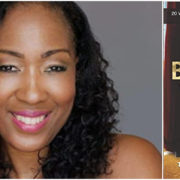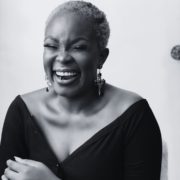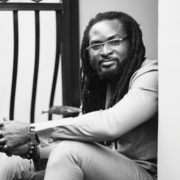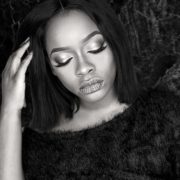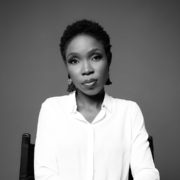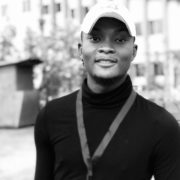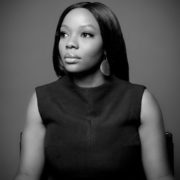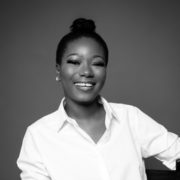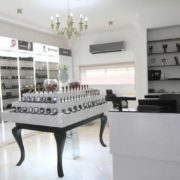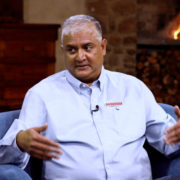
How did you prepare to start editing the Smart Money Woman, organizing scenes and takes?
I didn’t have my assistant on the Smart Money Woman project in post-production due to the budget. I had to do the assisting – editing bits, which is organizing; the scenes, looking at the footage, prepping the material before I start cutting. That came with challenges of course because it’s boring……you just wanna start telling the story with the materials that you have but I spent quite some time organizing the material because the more organized your project is, the quicker you will work on the project. So what I had to do was have all materials posted on my wall in my post-production edit room at home.
It gives me a visual representation of where I am in the project and it’s easier for me to give feedback to the client on scenes we may have missed and so on. So, that is how I prepared myself – by having my wall of post-production and organizing the project on paper so that when I start working on it, I’ll be able to tackle it without having problems.
And since I was the assisting editor (i.e assisting myself), I had to look deep into the footage, that is, even when the director calls “cut”, you might find a reaction that will be useful later on whereas if you have an assistant, they would give you want the script says or what you need. So, I was mentally & physically taking notes of things I’d like to see while I was organizing the material.
How did you decide when and where to make a cut?
In a way, it’s like having a conversation with someone and being able to know the right time to say something without interrupting the person speaking. Having that social skill, in terms of communication is kind of like second nature, except if you’re not a nice person and you just want to interrupt people. The most important thing when you’re editing is the story.
The story takes up about 70% of your attention/what you focus on. So, what informs my decision on where to place a cut is whether or not that cut would advance the story. For instance, a comic comment is as funny as the reaction. So if a character says a joke, that is your cue to put a reaction to that joke and make a cut there.
Another thing that I do besides knowing the flow and rhythm of how the edit should go is that I draw scene anatomy of the most important scene that I feel like this is what the director/story is trying to communicate to the audience.
So, I would draw a scene anatomy the emotional climax of the scene i.e the shot vs the time. In the diagram, you would say, “the duration of this shot should be 00.00sec to 8.00sec for it to communicate what I’m trying to communicate”.
In that scene, your scene anatomy might look like you start from an extreme close up & then ease your way until you have a wide shot and then you go back. It all depends on what the story is trying to communicate to the audience. So, these are some of the things that inform my decision on where to place a cut.
How can editing change the tone or emotion of a scene?
One of the reasons why I decided to work full time as an editor is because editing gives you the opportunity to direct for the second time. I can change the story in post-production & editing.
So when I’m editing the scene, I decide that this is what I want the audience to feel. If the story is trying to communicate a character going through a struggle, like Zuri for instance, I have to mentally prepare myself to feel that emotion that the character is feeling.
So if I know what the character is feeling, I’ll know how to communicate it to the audience and that basically means manipulating the audience to feel what the character feels. This is one of the things that would inform your decision on the rhythm, pace & tone of the dialogue. All these tools will help you build the emotions in the scene.
What kind of problems came up when you were editing The Smart Money Woman?
There were a couple of challenges. For one, my biggest challenge was a lack of communication between myself and the client, due to the fact that I had to work remotely and most of the post-production work happened in my space.
I didn’t have the clients come in to view due to the COVID restrictions, so that meant, I had to do an edit, export the edit, upload it, send it to her, she had to download it, watch it, give me feedback, I had to make corrections, send it back and so on. The whole back and forth added to the downtime of the project & for this project it so happens that I’m in Nigeria, faced with the problem of the internet.
I and Arese had a lot of problems with the internet. Sometimes I would record my screen trying to upload 200MB worth and it would be showing me 1 day remaining. I spent a whole lot of time trying to get materials to Arese, to the producer, Lala and to the director as well. It was challenging having to communicate and wait for feedback because the clients also have other things to attend to and sometimes it’s a couple of days.
When did you decide that you wanted to be an editor? Did you try your hands at any other type of filmmaking position?
Interesting… My uncle is a filmmaker, Anyakalu Aka, He was the one that inspired me to be a filmmaker. I was his page boy at his wedding and I remember seeing a lot of Nollywood actors and stars. I was about 4 or 5 then when I met all my idols & somehow I knew I would like to be in the filmmaking industry but 4 year old me didn’t know what it was.
remember watching foreign content, I remember watching family matters as a little kid. I grew up in what you would call the ghetto part of Lagos, I grew up in Orile and in that part of the world, you don’t really understand English. So when you watch TV, you just watch for the sake of watching, you don’t really understand…..Well, I’m speaking for myself because my vocabulary wasn’t that big.
I remember as a child watching family matters and I would laugh when the laugh cue kicked in because I didn’t understand what they were talking about, but once the laugh gags cue in, I know that’s my cue to laugh so I’d just laugh, without understanding what they were talking about. But in doing that, I began to understand that “Oh, so they laugh when there’s something funny”. So I was paying attention to how editing was being done and I started noticing the cuts in those content.
If I’m not laughing when the laugh gag cues in, then I would be detecting when the cut would come in. So I’d sit in front of the TV and I’d try to guess when the picture would change, which is a cut. So I’d go “cut” and I started to understand the rhythm and what they were trying to communicate without really understanding what filmmaking is. At this point, I think I was 6 or 7. I grew up watching a whole lot of content and I knew it was what I wanted to do as a career even though in schools you don’t get guided to make career decisions.
So, I went through school thinking I would be in Law or study Mass Communication in Nigeria, but I knew the limitations of trying to be a filmmaker in Nigeria and I decided to go to a film school to study editing and cinematography.
So, to answer your question, “Did I try my hand in other types of filmmaking positions? Yes! I would say I’m a Jack of all trades because I was already working in the capacity of an editor before I went to film school to study it. So, I went to film school to study editing, directing and cinematography. I directed a short film called, “Kelechi”, which has been screened in a whole lot of film festivals around Africa. I used to shoot for “Godfather” in Cape Town. I’ve shot and edited a lot of music videos for him. I’ve shot some music videos for Show Them Camp, Ewelemeji, Tropicana. I have tried my hands in directing, editing and cinematography; which I actually have more interest in because editing pays the bills and a whole lot of people know me as an editor & I don’t devote enough time to the other interests. I’m also an analogue photographer and I contribute to shutter stock, Getty images, Eyem. So, I create photography materials outside filmmaking, my pictures sell on shutter stock, on all the stock platforms. For me, editing is second nature but my interest is in directing and cinematography…..believe it or not.
What have you enjoyed about editing this particular show? A: So, The Smart Money Woman is my first TV Series in Nigeria. I did a whole lot of TV Series in my 8 years of studying and living in South Africa and The Smart Money Woman being my first project or TV Series in Nigeria was very interesting I would say because I’ve always wanted to make films in Nigeria, tell Nigerian stories and create Nigerian content but of international standard or quality rather, and that’s what I enjoyed about The Smart Money Woman in the sense that they made the effort to raise the bar in terms of quality, production value and the actual look and feel of the show. So, they paid more attention to the wardrobe, the location, there are different parts of Lagos that I didn’t even know existed. The look and feel of the locations and setting of the film give it an international vibe and that’s what I enjoyed most about it.
Editing the material was very fun because it felt like I was working on South African content. And obviously, the actors, I was working with some of them for the first time. These are A-class actors and they literally raise the bar with their performance. And, another thing I really enjoyed about the show is that you’re telling stories about 5 women and you get the vibe that these are actual friends, they’re not just actors that are playing. I don’t know if they’re friends in real life but that’s the vibe that you get from the show. So it feels like they’ve spent a year with each other before they come on set to be friends. The sense of realism to the material that I was working on was very admirable.
With all the adjustments, how much can a show or movie end up deviating from the original script?
Like I said earlier, editing is directing for the second time. I and Arese changed the story a whole lot as well as other feedback we got from Lala and Isoken. The story changed in post-production. We introduced a lot of styles in post-production and we completely deviated from the original script in the sense that we decided to use voiceovers to give context. Because you have to remember that this is adapted from a book as much as it is entertaining and fun to watch, you also should learn valuable tips on how to use your money, save your money and invest your money. So we had to introduce voiceovers to tie up the narration and also help the audience understand the context of what they’re watching. Because you can easily get sucked into the entertainment value, but you should also learn what you’re supposed to learn with regards to saving, friendships, debt and all these important things that the book actually touched on which the characters are living. So we deviated from the original script, we decided to use a whole lot of motion graphics to also enhance the production value.
Were you influenced by any directors or film editors, Nigerian or International, in the development of your craft over the years?
Definitely. I would say I’m a student of great amazing films that I’ve over the years. These are themes that have shaped my viewpoint as a filmmaker. One of my greatest idols, one of the best editors ever is Walter Murch and he did movies like “Apocalyptic Now”, so many great movies. I remember reading a book by him called, “In the Blink of an Eye”.
It’s a must-read for every editor who wants to take their craft to the next level. I was also inspired by Stanley Kubrick, Alfred Hitchcock, Steven Spielberg, Martin Scorsese, Steve McQueen, a lot of filmmakers, directors, editors that over the years that I have watched and studied their work. So, definitely, I’m a product of content that I’ve consumed over the years. Even on YouTube and Instagram, in this age that we live in, we are always bombarded with content, we’re always watching materials, we’re always on our phones, we’re always on our screens. We’re like a zombie generation that can’t stay away from screens, so directly or indirectly we are influenced by the content that we consume
How do you think people will react to the final product?
This is what I’ve always wished for… that for every content that I am a part of, I like to bring myself to the place of the audience to see it from their perspective. And that means I have to be my one critique. I have to say to myself, “This is cool, what you did there is cool” and I also have to say to myself that “This is bad, you should do better.” So, me being my first critique will help me understand how the audience will react to the final product and that is, I’ve seen other content in similar genres that people are working on and I know The Smart Money Woman is different. Different in the way we decided to tell the story and I’m 100% certain that people are going to love it because it’s different and we have to come to a place where we understand that the Nigerian audience has access to the internet, they have access to Netflix, they have access to Apple TV and YouTube and all this video-on-demand streaming platforms, so they now know what good content is and we owe it to the audience to give them good content. We can’t give them anything that is substandard, we have to keep raising the bar. And I know for a fact that the Nigerian audience is going to love it and they’re going to be proud of The Smart Money Woman!


